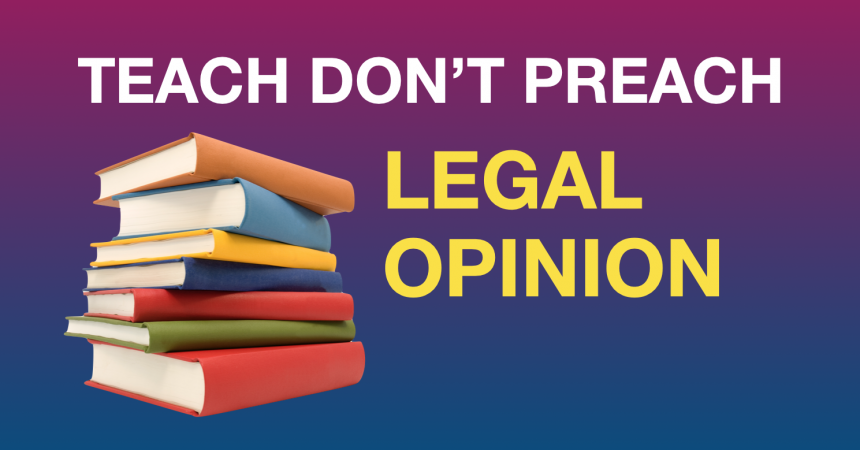
Schools are obliged to use existing funding to supervise students
Publicly funded schools are obliged to use their existing funding to supervise students outside the religious instruction class.
The recent Legal Opinion that Atheist Ireland obtained confirms that schools cannot refuse to supervise children outside the religious instruction class on the basis that they do not get enough funding from the state.
Atheist Ireland will continue to campaign for the Constitutional right to not attend religious instruction and be supervised outside the class.
Here is the relevant section of the Legal Opinion:
Are schools obliged to use their existing State funding to facilitate that right without
demanding extra State funding?
- Yes.
- To come to any other conclusion would render the enjoyment of the right to not attend religious instruction contingent on the level of funding. Yet, this would fly in the face of the plain text of Article 44.2.4°.
- It is worth reiterating at this point my view that the right to opt out is not a right exercisable solely in the context of the adequacy of the level of funding to a school. Provided the school is a public school receiving some State funding, the right must be respected, whether or not the funding is adequate.
- It is clearly established that private entities (i.e. entities other than State bodies) may be held liable for breaches of constitutional rights.45 Therefore, schools are required to observe the constitutional rights of enrolled children.
- There is a separate and express duty on the State to ensure that legislation is such as will not prejudicially effect that right. However, provided a school receives some funding, the right is not contingent on the level of that funding and must be vindicated by the school.
What is the effect of the phrase “to affect prejudicially”? Does this mean that children
who opt out of religious teaching must be treated the same as children who choose not to
take any other optional subject? For example, if you choose not to do French or biology,
you are given another subject and not made to sit at the back of the French or biology
class.93. The words “affect prejudicially” in Article 44.2.4° likely mean simply that the right must not be violated and must be respected. Given that the right appears in my view to subsist generally in the constitution and is not confined to the specific context of Article 44.2.4, it is in my view unnecessary to attempt to divine a forensic definition of this term.
94. Conceptually, there appears to me to be three possibilities as to what precisely the right protects and requires.
95. The first is that a student simply has a right to attend a public school and simply not part take in religious instruction. On one interpretation, this right may be vindicated where the child is simply left in the classroom while religious instruction is taught and the child is simply permitted to do his or her own work. Or, perhaps in a rather more unusual situation, the student may be entitled to leave the school, returning home for example and returning to school when the religious instruction is over.
96. The second is that the student is allowed to leave the classroom and to be supervised in another classroom in the school.
97. Three, the student is entitled to be schooled in another subject while religious instruction is taking place.
98. Because Article 44.2.4° refers to the right not to attend religious instruction in the context of an article on funding, it seems to me that something more than the first of these three options is protected under the Constitution. Put another way, if the right was simply to leave the school or sit at the back of the class room, that would never cause any additional funding requirements for schools. If that were so, the issue of funding would never “prejudicially effect” the right to attend a school receiving public money while not attending religious instruction at that school. Thus, this interpretation of the Constitution seems invalid.
99. A further reason why it seems that the right protects something other than the first of these three scenarios is that Article 44.2.4° refers to the right to not attend religious instruction. The ordinary meaning of “attend” is to be present at, and accordingly, it seems that in order to vindicate that right, a student must not be forced to be present at religious instruction classes. This militates against leaving
a student in the classroom while the subject is taught and requires either removal and supervision or the teaching of another subject altogether.100. Accordingly, from a constitutional perspective, it is my view, that the right protects more than sitting at the back of a religion class or even leaving the schoolwhile it is being taught. It seems to me that the right encompasses, at the very least,the right to leave the classroom during religious instruction while remainingsupervised or to be taught another subject. As between these two possibilities,there is a decent argument that schools should not give more teaching time to somestudents over others on the basis that the latter has opted out as to do so is todiscriminate against the student on religious grounds.






0 Comments
No comments!
There are no comments yet, but you can be first to comment this article.